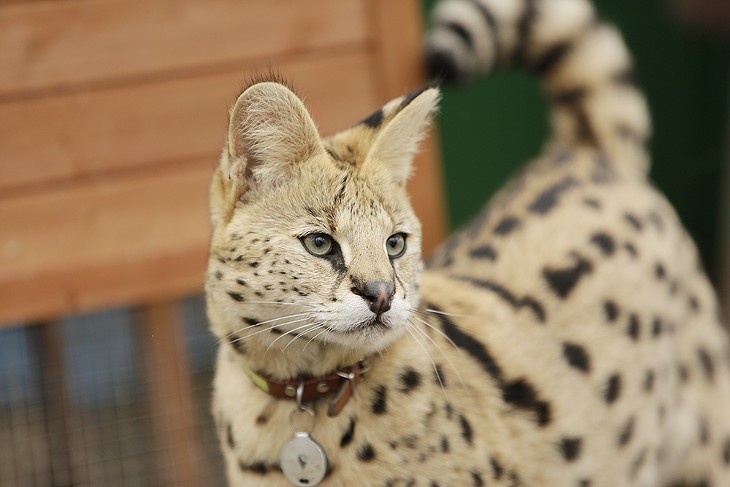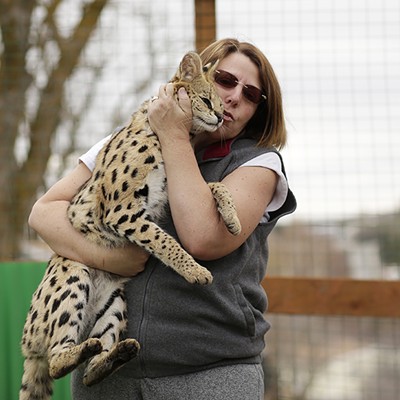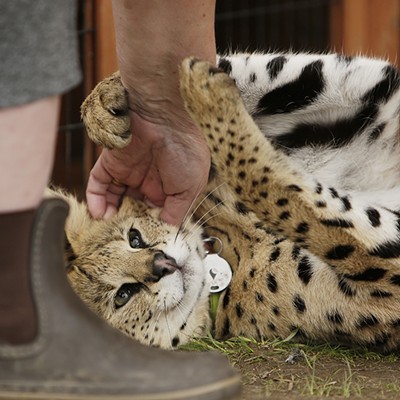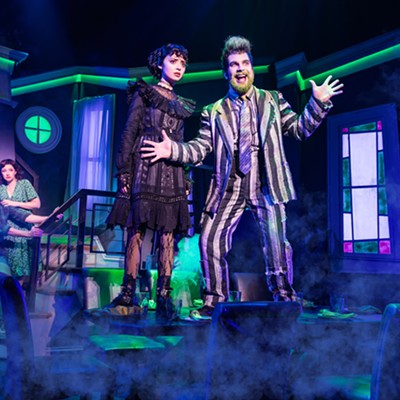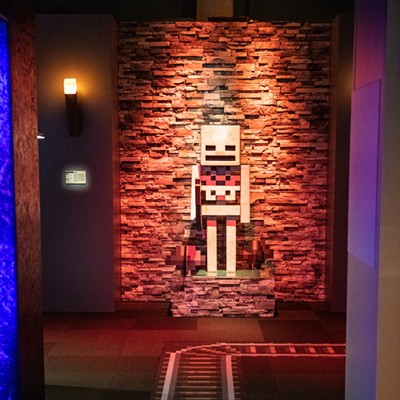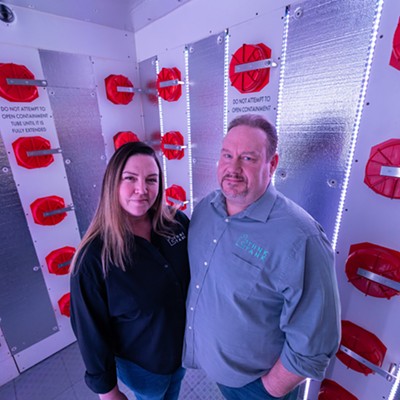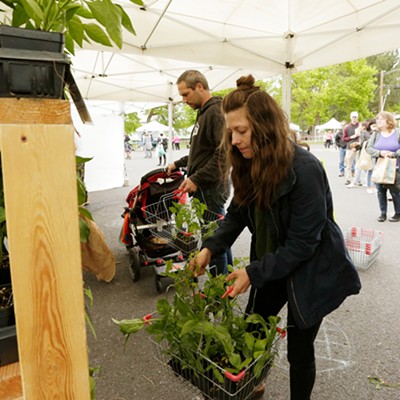Boomer is pacing.
With the carcass of a small, quail-sized bird clamped in his jaw, the lanky, black-spotted African serval is highly alert to the movements and sounds all around him: dead grass rustling in a spring breeze, the faint mews of a house cat in the distance. His short tail twitches and bristles.
Once he senses it's safe, and that nothing is going to snatch away his meal, the big-eared cat stops in a corner of his enclosure. With the feathered carcass still in his teeth, Boomer vigorously shakes his head and flings the bird into the air, not unlike his domestic counterparts do when playing with a toy, or a small dead animal.
After tossing it around a few more times, the 1-year-old serval crouches down and begins gnawing the small chicken apart. Tiny bones snap and grind against Boomer's teeth, audible over the Palouse wind. The 30-pound cat devours the entire bird in a few minutes as his owner, Anya Spielberg, looks on.
"Boomer, you even ate the head!" Spielberg says to him in surprise.
It's not unusual, she adds, to come out to the cat's 1,200-square-foot enclosure and find leftover, "undesirable" bits (intestines, heads and other entrails) of his twice-daily, raw meals scattered across the dirt.
Boomer is, like all members of the felidae family, an obligate carnivore. Spielberg orders his food (whole, frozen small animals) online, and estimates it costs about $20 a day to feed him. His favorites are guinea pigs and small chickens. Spielberg doesn't let the cat slaughter his own dinner as a measure to prevent unwanted carnage. Although she hand-raised Boomer, starting with bottle feeding when he was five weeks old, she understands he's still a wildcat that's very much in touch with its natural instincts.
"That time period is really important for bonding with their human. They are very single-human-focused," Spielberg explains.
Though Boomer was more impressionable and physically manageable as a kitten, Spielberg remains the only human the serval generally tolerates. Their bond, and the trust he has in her, is deep.
"[Food] was the thing that drove him forever," she says. "Now he prefers my companionship over food, and the way he can communicate with me, in his language, is really incredible to me. He is so happy to see me, and his purr is so loud and intense."
Still, he won't allow anyone else — not even Spielberg's husband — to handle him. Sometimes he even hisses at his "mom," too, when displeased or annoyed.
"He wouldn't hurt my husband, but he would hiss like he doesn't prefer [interaction]. It's like a threat but without action for people he knows," she says. "It's like 'I want you to know that I am not cool with this, but I'm not gonna hurt you.'"
When given enough time and space, Spielberg says Boomer usually relaxes around new people and environments. He likes to ride in the car with her, and to go on leashed walks around the rural Palouse countryside on nice days. She's even taken him camping. Whenever she and Boomer go places they may encounter other people or animals, like on walks, he always wears a "do not pet" sign on his harness.
"Servals are not thought to be aggressive, and my experience with him is that he is not aggressive, but he is fearful in situations with new animals," she explains. "If he felt threatened, he might defend himself with his claws, and because of that he never has access to any other animals other than those that we have control over."
Recently, Spielberg was invited by the Whitman County Library District to bring Boomer to its rural branches for a series of all-ages educational sessions to share the story of their unusual relationship, facts about the serval species and what's required to keep one as an exotic pet.
"I show them how it's possible for a serval to interact with a human, because he will show me affection even though they don't get to touch him," she says. "I also try to teach kids about getting in touch with what your passion is, and I use this as an example. My passion is these cats, but I tell them to find the thing that you just love, even if it's unusual."
Spielberg didn't always dream of owning a wild African serval, which are widespread in the continent's sub-Saharan region. There, they live mostly solitary lives, using their ultra-sensitive ears to locate prey — small rodents, reptiles, insects and birds — before launching into a fatal pounce as high as 6 feet using their long, powerful legs.
"I kind of respect their wildness, and I'm not a fan of zoos. I just didn't really believe in domesticating them until I met a breeder who had one," she explains. "I got to know what the quality of life was like for that cat, and I decided to take the plunge."
Knowing the medium-sized wildcat would require ample space, Spielberg and her husband moved from Pullman to the sleepy Palouse town of Oakesdale, about halfway between Spokane and Pullman.
Bringing Boomer into the family was also no bargain. Beyond the cat's initial price tag of around $6,000, the couple invested about $15,000 into his outdoor enclosure, which has a double-door entrance for security and an attached, climate-controlled unit that's heated and air conditioned when needed.
"You absolutely cannot care for a serval if you don't give them the proper habitat. They won't thrive, and they won't live," she says.
In Washington state, keeping a serval is allowed by state law, and doing so does not require a special permit. Boomer slips under the state's definition of a "potentially dangerous wild animal," which in the felidae family is defined as "only lions, tigers, captive-bred cougars, jaguars, cheetahs, leopards, snow leopards and clouded leopards." In Idaho, private citizen ownership of servals is illegal without a special permit.
In addition to caring for Boomer, Spielberg works part time as a hospital chaplain and breeds Savannahs out of her home. Savannahs are a hybrid domestic cat first created in the late 1980s when an African serval was crossbred with a Siamese cat. Spielberg fell in love with the breed's lively personality seven years ago and founded her cattery, Savannah Exotics, a few years later. She currently has six females and four males in her breeding program.
Two of the queens are bunking with Boomer. Spielberg hopes he'll choose one of these "wives" to mate with and successfully produce what's called an F1 Savannah, a cat that's half serval and half domestic cat. (Most Savannahs that become household pets are four or five generations removed from their serval ancestry.) First-generation Savannahs are rare because they're incredibly difficult to produce, which means the prospect with Boomer could be entirely unsuccessful, Spielberg notes.
Bringing Boomer into her life wasn't made with an initial intent to breed him, even though her work with Savannahs directly influenced her choice to purchase the serval. After some thought on the idea, she figured it was at least worth a try. The serval has at least taken well to his two little companions, Barbie and Paisley, growing quite protective of both, she says.
Critics of deliberate companion-animal breeding or keeping wild animals as exotic pets may harness some contempt when they learn of Boomer. Spielberg realizes these are legitimate sentiments, and a fair consequence of her choice. She admits that her relationship with the cat even conflicts with some of her own beliefs.
"I think that life is full of contradictions, and that it's possible to hold two beliefs at the same time," she says.
But the joy she sees from the bonds formed between her Savannah kittens and their purchasers, she believes, outweighs concerns over the creation of more cats in the world despite pet overpopulation.
"In terms of servals, I do think that it's selfish. I'll be really honest — it's a selfish relationship. Someone else produced the kitten, and I wanted to be a part of the experience of relating to a wildcat because it's in me to make that kind of a commitment, and to bring joy to my serval's life by taking care of him appropriately and giving him a quality life, and using him as a way to educate the public on how to respect animals and appreciate nature."♦
Cat Science with Anya and Boomer • Wed, April 11, at 3:30 pm • Free • Endicott Library • 324 E St., Endicott • 657-3429 • Also Wed, May 16, at 12:30 pm • Rosalia Library • 402 S. Whitman Ave., Rosalia • whitco.lib.wa.us



